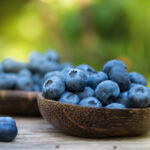Ecuadorian soursop finds opportunities and challenges in Europe

The European Union is the main destination for fresh Ecuadorian soursop, with Italy and France accounting for 69% of the country's total exports.
Fresh soursop exports doubled between 2021 and 2022, with an increase from 121 to 243 tons. The growth has generated interest on the part of new producers and exporters to enter the European Union market.
Ecuador is the world leader in fresh soursop exports to the EU with more than an 86% share in the four main markets: France, Italy, Spain, and the Netherlands.
To support new exporters interested in these markets, the project Camino a la Reactivación del Ecuador Agroalimentario (CREA) gave a presentation detailing the requirements and trends that exporters of processed soursop should take into account. CREA works to strengthen value chains and facilitate the marketing of Ecuadorian products in Europe.
During the presentation, Valeria Escudero, strategist and export promotion expert for Globally Cool, shared the different aspects involved in exporting the fruit to the European Union.
She indicated that to evaluate the potential of a new market, four points must be evaluated: the size of the market (i.e. the purchasing power it offers), the dynamism with which the products move, the export potential, and the evolution of demand.
Frozen soursop pulp
Escudero said frozen soursop pulp primarily ships to the United States, representing 77% of total exports, followed by Spain with 19% of exports.
In 2022, sales of Ecuadorian frozen soursop pulp grew by 95% year-on-year in Spain. Ecuador leads frozen soursop pulp exports in all EU markets, with the exception of France.
According to Escudero, Germany has great untapped potential to use the fruit as a supplement. Google Trends indicates that Germany was the second European country to search the word "soursop" in 2022.
"Germany and France represent more than 40% of the processed food industry, so it's of interest to look for companies that are in the sector and introduce the fruit to them," Escudero said.
Consumer trends
A variety of factors influence consumer trends globally, including demographic shifts, economic and political influence, and lifestyle changes.
"People are much more aware of health and wellness since the pandemic. The United Nations has food security as a priority and sustainability is something everyone is talking about in the industry," Escudero said.
She emphasized the importance of being socially and environmentally sustainable to gain access to new markets, given the demanding requirements from both governments and importers.
"According to the latest studies, consumers look mainly at the ingredients of the product they are going to buy. Therefore, we must give more and more importance to natural ingredients," she said.
Indicating the health benefits of the product, as well as the origin and certifications on the packaging, makes the product more attractive, according to Escudero.
European market
Escudero said they have seen an increasing interest in tropical fruits in Europe, with exports going up for a variety of products.
She added that exporters must take advantage of this momentum to grow interest in soursop, as it has many health benefits that help prevent diabetes and other diseases.
"We have to work on adding value to the product and show the different ways to consume it with a clear message either on the packaging or on the website," Escudero said.
One of the main markets for tropical fruit is for frozen fruit that can be used to make juices or smoothies.
Organic certifications have also become very relevant for the European consumer.
"You have to replace artificial ingredients with natural ones and show consumers clearly and quickly what they are buying," she said. "Ideally, it is also good to certify that you are implementing sustainable practices in the production process on a social and environmental level."
Entry requirements for Europe
Escudero invited exporters to review the Global Food Safety Initiative, which has three certification schemes:
- International Featured Standard (IFS)
- British Retail Consortium Global Standards
- Food Safety System Certification
Compliance with these requirements is mandatory for entry to the EU.
Beyond the basic requirements, she said it is important to test what consumers are looking for and to have a well-established marketing campaign before beginning exports.
Educating consumers on a novel product helps generate interest and helps them understand why they should try the product.
"In the testing period, use focus groups, send samples to potential buyers, go to trade shows with trials to test the product. This will allow you to adapt your product to the market and save costs and time," Escudero said.
To enter the market, Escudero recommends doing so through importers specializing in exotic and frozen fruits and the beverage industry in Europe.
As for supermarkets, retailers specializing in organic or healthy products can be a good entry channel.
Health food stores and pharmacies are also interesting markets, as well as e-commerce through Amazon and other available platforms.















































